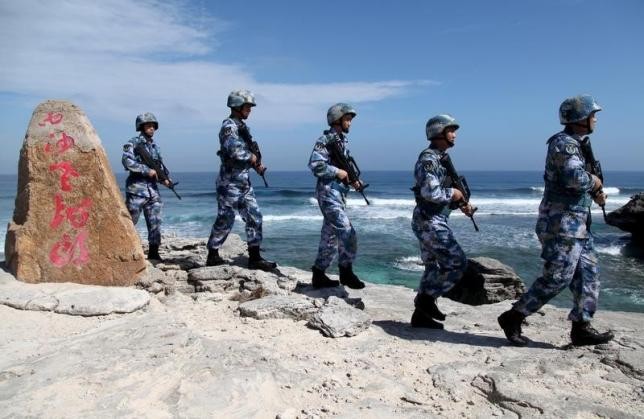The annual war drills in the South China Sea have begun, led by one of China's most advanced warships, the missile destroyer Hefei.
A report by usnews.com said that five other guided-missile destroyers, a frigate and a supply ship based in Sanya are participating in the naval exercises that include reconnaissance drills with submarines and simulations on how to break an enemy blockade.
Forces based in the Spratly and Paracel Islands will join the ships in the exercises, according to a Xinhua News Agency report.
Last week, Song Zuying, the Chinese popular singer of patriotic anthems, entertained troops in the Spratlys where she performed songs such as "Ode to the South Sea Defenders," whose lyrics speak of "troops of stout men with guns in their hands who battle the wind and fight the waves to guard the nation's door."
The extensive work done by China at Fiery Cross Reef, which showed lighthouses, harbors and other structures, as well as Type 071 amphibious dock ships, can be seen in photos in the background of Song's performances.
Last week, China also joined a multinational exercise off the waters of Brunei and Singapore, in which it sent the Lanzhou missile-guided destroyer. Joining the exercise were the navies of 10 Southeast Asian countries as well as those of the U.S., India and six other partners for maritime security and counter-terrorism dialogue.
In the land-storming exercise, the U.S. participated with a P-8 Poseidon surveillance aircraft, the destroyer USS Stethem and Army units.
"Our crew will be able to see first-hand how other navies operate and we can learn from them while sharing our own operational tactics and procedures," Cmdr. Harry Marsh, commanding officer of the Stethem, said.
Last month, China rejected a request of the USS John C. Stennis to visit Hong Kong, which the commander of the U.S. Navy's 7th Fleet said would not affect the relations between the two militaries despite mounting tension in the South China Sea.
Vice Adm. Joseph Aucoin said on Friday, May 6, that the China-U.S. military-to-military relationship would remain strong, after the USS Blue Ridge, the fleet's command ship, was allowed to dock in China's financial hub of Shanghai.
"But the very fact that we're on this pier, that our two navies, our two countries, don't let that minor hurdle get in the way of our relationships. Our, the relationship between our two countries is much too important for a port visit to get in the way of that," Aucoin told reporters.
Meanwhile, during a discussion at the Council on Foreign Relations, the U.S. Coast Guard commander has accused the Chinese coast guard of provoking the U.S. Navy.
"We are seeing Chinese fishing trawlers provoking the United States Navy, carrying out sovereign acts, but just over the horizon is the PLA," Rear Adm. Paul Zukunft said.
"So our biggest concern is about a miscalculation. But their coast guard has not been transparent in terms of what their intent is," Zukunft added.
A code of conduct for armed planned sea encounters is being worked out by the U.S. and its Chinese counterparts, the admiral said.
During the same forum, Adm. John Richardson, chief of naval operations, said that the Navy's freedom of navigation operations was working as they sailed close to the Chinese ships. He said they aim to push for an international set of rule to ensure the free flow of goods in the sea lane.
"They don't extend beyond that," he said. "There's just a pure advocacy for that system. So we design those very carefully. It's a policy decision that is made, interwoven with those other elements of power. So I think both aircraft, ships are ready to execute those as they fit into the plan."
Although China had criticized Washington for provoking conflict with such maneuvers, it said it would not hamper free navigation.



























